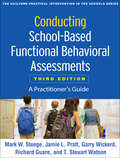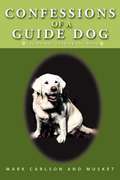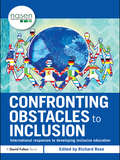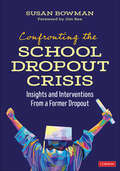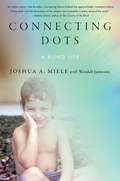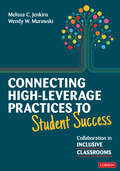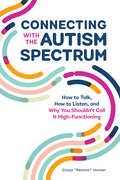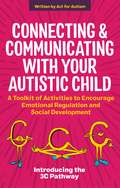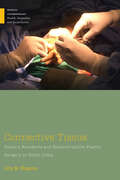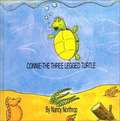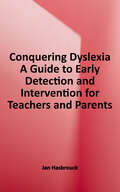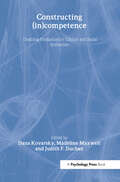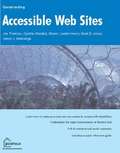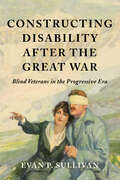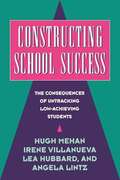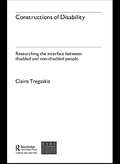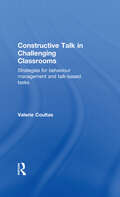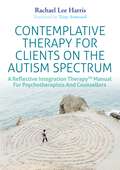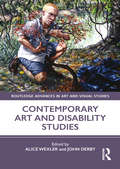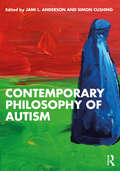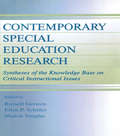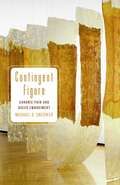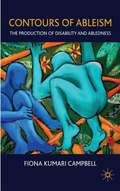- Table View
- List View
Conducting School-Based Functional Behavioral Assessments, Third Edition: A Practitioner's Guide (The Guilford Practical Intervention in the Schools Series)
by Richard Guare T. Steuart Watson Frank M. Gresham Mark W. Steege Jamie L. Pratt Garry WickerdWidely recognized as a gold-standard resource, this authoritative book has been revised and expanded with 50% new material. It provides a complete introduction to functional behavioral assessment (FBA), complete with procedures, forms, and tools that have been piloted and refined in both general and special education settings. Numerous vivid examples illustrate how to use the authors' behavior-analytic problem-solving model (BAPS) to synthesize assessment results and guide the design of individually tailored interventions. Practitioners and students enjoy the engaging, conversational tone. In a large-size format with lay-flat binding for easy photocopying, the book includes 17 reproducible checklists and forms. Purchasers get access to a companion Web page where they can download and print the reproducible materials. New to This Edition *Revised BAPS model reflects the latest research and offers a more comprehensive approach to FBA. *Chapters on professional and ethical standards; analyzing how biological/medical conditions, thoughts, and emotions influence behavior; and analyzing how executive skills deficits influence behavior. *Chapters on testing hypotheses about the functions of problem behavior; testing reinforcer effectiveness; and evaluating function-based interventions. *Chapter providing applied learning experiences for professionals and students. *Most of the reproducible tools are new or revised. This book is in The Guilford Practical Intervention in the Schools Series, edited by T. Chris Riley-Tillman.
Confessions of A Guide Dog: The Blonde Leading the Blind
by Mark Carlson MusketHave you ever wondered what a guide dog does? How do they know to lead a blind owner? Can they understand traffic lights? Most importantly, how does the owner know where to pick up the poop? This memoir answers these questions-and more. It tells what guide dogs are supposed to do. In this book, Mark and Musket tell their story with humor and emotion.
Confronting Obstacles to Inclusion: International Responses to Developing Inclusive Education (nasen spotlight)
by Richard RoseConfronting Obstacles to Inclusion uniquely and comprehensively addresses interpretations of inclusive education by drawing upon the experiences and expertise of leading writers and academics who have direct experience of teaching and researching this area around the world. This landmark publication combines theoretical chapters with practical material demonstrating how the theories can be put in to action in the classroom. The contributors, who all have regular contact with pupils and teachers in inclusive settings, provide a broad spectrum of ideas, examine a number of key themes and interpret these in an international context, such as: the causes of exclusion, the obstacles to inclusion and how these can be overcome supporting families how we can learn from students professional development enhancing teaching and learning support in the classroom. This authoritative text will be of immense interest and use to practitioners, policy-makers, researchers and campaigners who are working towards a more equitable and inclusive society. Through a synthesis of theory and practice the book offers readers an opportunity to explore local, national and international perspectives and raises questions with regards to our current understanding of inclusion. Whilst the interrogation of the concept of inclusion is, in itself important, the book provides examples of professional approaches to the key questions which are currently challenging the education of a diverse range of learners.
Confronting the School Dropout Crisis: Insights and Interventions From a Former Dropout
by Susan BowmanReach out before they drop out Student dropout rates continue to soar, despite decades of funding, research, programs, and professional development initiatives. This is a wakeup call. Written by a former school dropout, Confronting the School Dropout Crisis encourages educators and related professionals to discover and explore the sometimes unnoticed reasons that youth drop out of school. With fresh strategies for prevention and intervention, this critical resource includes: How to reach and recover students who are at risk of dropping out or who already have Clear, impactful strategies that better engage and positively impact students who are at risk Moving personal stories from teens and the author Confronting the School Dropout Crisis invites you to rethink how you address real dropout issues with young people and how to incorporate fresh approaches to better reach and positively impact these students and their caregivers—before it’s too late.
Confronting the School Dropout Crisis: Insights and Interventions From a Former Dropout
by Susan BowmanReach out before they drop out Student dropout rates continue to soar, despite decades of funding, research, programs, and professional development initiatives. This is a wakeup call. Written by a former school dropout, Confronting the School Dropout Crisis encourages educators and related professionals to discover and explore the sometimes unnoticed reasons that youth drop out of school. With fresh strategies for prevention and intervention, this critical resource includes: How to reach and recover students who are at risk of dropping out or who already have Clear, impactful strategies that better engage and positively impact students who are at risk Moving personal stories from teens and the author Confronting the School Dropout Crisis invites you to rethink how you address real dropout issues with young people and how to incorporate fresh approaches to better reach and positively impact these students and their caregivers—before it’s too late.
Connecting Dots: A Blind Life
by Joshua A. MieleIn this extraordinary memoir, a scientist who became blind at a young age shares how he navigates the world around him, and how his contributions led to cutting‑edge work in accessibility—packed with humor, adventure, and insights on life and disability. At the age of four, Joshua Miele was blinded and badly burned when a neighbor poured sulfuric acid over his head. It could have ended his life, but instead, Miele—naturally curious, and a born problem solver—not only recovered, but thrived. Throughout his life, Miele has found increasingly inventive ways to succeed in a world built for the sighted, and to help others to do the same. At first reluctant to even think of himself as blind, he eventually embraced his blindness and became a committed advocate for disability and accessibility. Along the way, he grappled with drugs and addiction, played bass in a rock band, worked for NASA, became a guerilla activist, and married the love of his life and had two children. He chronicles the evolution of a number of revolutionary accessible technologies and his role in shaping them, including screen readers, tactile maps, and audio description.Connecting Dots delivers a captivating first-person perspective on blindness and disability as incisive as it is entertaining, and ultimately triumphant. Joshua Miele's story is one of one ordinary blind life with an indelible impact.
Connecting High-Leverage Practices to Student Success: Collaboration in Inclusive Classrooms (The\norton Series On Inclusive Education For Students With Disabilities Ser. #0)
by Wendy Murawski Melissa JenkinsTransform classrooms and student performance with evidence-based, effective practices Two brains are better than one, as the saying goes, and this is especially true in education. Educators who employ effective collaboration and co-teaching greatly amplify student engagement, achievement, and growth, particularly for those learners needing extra support. Written by two of the nation’s top experts in co-teaching, Connecting High-Leverage Practices to Student Success is an essential, reader-friendly guide for educators and instructional leaders who are passionate about creating truly inclusive classrooms where all students thrive— academically, behaviorally, socially, and emotionally. Inside, authors Melissa Jenkins and Wendy Murawski provide: Three clearly defined steps to build a strong foundation, leverage collaboration, and support students’ growth A laser focus on high-leverage and evidence-based practices for general and special education that optimize educators’ impact, including collaboration, instruction, assessment, and social emotional/behavior skills Seamless integration of practices within MTSS and RTI processes to meet the needs of all learners Countless and concrete samples, examples, tools, reflection exercises, and supplemental materials that enable you to move from theory to immediate instructional practice Positioning collaboration as the catalyst to maximizing high-leverage and evidence-based practices for the success of all students, this easy-to-use handbook belongs on the desk of every teacher working toward a truly inclusive environment.
Connecting High-Leverage Practices to Student Success: Collaboration in Inclusive Classrooms (The\norton Series On Inclusive Education For Students With Disabilities Ser. #0)
by Wendy Murawski Melissa JenkinsTransform classrooms and student performance with evidence-based, effective practices Two brains are better than one, as the saying goes, and this is especially true in education. Educators who employ effective collaboration and co-teaching greatly amplify student engagement, achievement, and growth, particularly for those learners needing extra support. Written by two of the nation’s top experts in co-teaching, Connecting High-Leverage Practices to Student Success is an essential, reader-friendly guide for educators and instructional leaders who are passionate about creating truly inclusive classrooms where all students thrive— academically, behaviorally, socially, and emotionally. Inside, authors Melissa Jenkins and Wendy Murawski provide: Three clearly defined steps to build a strong foundation, leverage collaboration, and support students’ growth A laser focus on high-leverage and evidence-based practices for general and special education that optimize educators’ impact, including collaboration, instruction, assessment, and social emotional/behavior skills Seamless integration of practices within MTSS and RTI processes to meet the needs of all learners Countless and concrete samples, examples, tools, reflection exercises, and supplemental materials that enable you to move from theory to immediate instructional practice Positioning collaboration as the catalyst to maximizing high-leverage and evidence-based practices for the success of all students, this easy-to-use handbook belongs on the desk of every teacher working toward a truly inclusive environment.
Connecting With The Autism Spectrum: How To Talk, How To Listen, And Why You Shouldn't Call It High-Functioning
by Casey "Remrov" VormerThe complete guide to connecting with adults on the autism spectrum - one of the 2021 Best Books on Autism from ChoosingTherapy.comFor a friend, family member, or coworker with autism, communication can be challenging. But Connecting with the Autism Spectrum can help you find common ground with expert tips and helpful insights about talking (and listening) to neurodiverse adults so you can make your interactions more transparent, meaningful, and rewarding for all.Written by Casey Vormer, a self-taught artist and autism advocate, this comprehensive guide is a trusted source for understanding neurodiversity that features a brief introduction to the autism spectrum. It also provides easy communication strategies like active listening and positive encouragement as well as steps to avoid misunderstandings by teaching how to recognize biases and correct them. Additionally, you'll learn why the term "high functioning autism" is a misnomer to define members of this vibrant community."It's important to look at every autistic person individually and recognize their obstacles—but more importantly, we should acknowledge their skills and avoid labeling them with 'high functioning autism' or 'low functioning autism' altogether," Vormer says.Unlike other autism books, Connecting with the Autism Spectrum delivers:An easy approach—Discover the best ways to communicate with those living with autism.Situational success—Find the right information for various situations and settings, including school, work, and social relationships.A sensitive tone—Get valuable information from a clear, honest point of view that does not seek to "cure" or manipulate people.Learn how to communicate better with those on the autism spectrum with this informative book.
Connecting and Communicating with Your Autistic Child: A Toolkit of Activities to Encourage Emotional Regulation and Social Development
by Tessa Morton Jane GurnettThis book teaches drama and immersive theatre-based activities for parents and professionals working with children and young people on the autism spectrum. The exercises follow the author's simple, person-centred '3C pathway' of connecting, calming and communicating, and enable parents to gain an understanding of the challenges an autistic child may face by 'walking in their shoes', while empowering children to become more self-aware and express themselves in healthy ways. The activities included in the book are tried-and-tested, accessible and easy to implement, such as breathing exercises, mirroring movements, and treasure hunts. Using these activities, parents and professionals can gain insight into the sensory and social challenges experienced by those on the spectrum and can work to build a positive and trusting relationship, offering a secure base for children's emotional development.
Connective Tissue: Factory Accidents and Reconstructive Plastic Surgery in South India (Medical Anthropology)
by Lily N. ShapiroAn ethnography of factory accidents and their attendant reconstructive plastic surgeries in Coimbatore, Tamil Nadu, Connective Tissue explores notions of risk, work and labor practices, and the way meaning is made from experiences of trauma, care, and recovery. The book charts a rough chronology of the accident—from the workspace that preceded it, the transformation of the workspace by the accident, through journeys to and treatment in the hospital, and then the various and complex ways in which the accident reverberates into the future during recovery. Connective Tissue revisits scholarship on factory labor by analyzing the accident as constitutive of the experience of work itself, and it refines existing conversations about the body, trauma, and care by introducing an analysis informed by theories of labor and production. Author Lily N. Shapiro argues that care does not happen in spite of or on the margins of capitalism, but rather that capitalism happens in and through care and caring relations. These experiences are intersected by identities of caste, class, and gender, and entangled in state discourse about labor rights, welfare, and industrial law.
Connie: The Three Legged Turtle
by Nancy NorthropConnie, a turtle with only three legs, teaches readers that the best thing they can do is always do their best even when it isn't easy or fun. Connie proves herself as a Handi and Abled friend saving the day in a terrible storm. And she does it with only three legs.
Conquering Dyslexia: A Guide to Early Detection and Intervention for Teachers and Parents
by Jan HasbrouckDyslexia is no longer a mystery. MRI scans and other tools of neuroscience have advanced our understandings in the last decade. We now know what to do to help students become skilled, confident learners. In Conquering Dyslexia, Dr. Hasbrouck shares the instructional approaches that work best for children who have this disorder, and the most current information for parents so they can advocate for their children and communicate with educators effectively. This book addresses: - What is dyslexia? - How to identify it - Early diagnosis and intervention - Teaching students - Supporting English Learners PRAISE FOR CONQUERING DYSLEXIA A thoroughly practical book that translates the science of reading and what we know about dyslexia into practice. A must-read for teachers, practitioners, administrators, and others on the frontline of teaching all children to read. Jack M. Fletcher, Ph.D., ABPP (ABCN) Hugh Roy and Lillie Cranz Cullen Distinguished Professor University of Houston
Constructing (in)competence: Disabling Evaluations in Clinical and Social interaction
by Judith Felson Duchan Dana Kovarsky Madeline MaxwellCompetence and incompetence are constructs that emerge in the social milieu of everyday life. Individuals are continually making and revising judgments about each other's abilities as they interact. The flexible, situated view of competence conveyed by the research of the authors in this volume is a departure from the way that competence is usually thought about in the fields of communication disabilities and education. In the social constructivist view, competence is not a fixed mass, residing within an individual, or a fixed judgment, defined externally. Rather, it is variable, sensitive to what is going on in the here and now, and coconstructed by those present. Constructions of competence are tied to evaluations implicit in the communication of the participants as well as to explicit evaluations of how things are going. The authors address the social construction of competence in a variety of situations: engaging in therapy for communication and other disorders, working and living with people with disabilities, speaking a second language, living with deafness, and giving and receiving instruction. Their studies focus on adults and children, including those with disabilities (aphasia, traumatic brain injury, augmentative systems users), as they go about managing their lives and identities. They examine the all-important context in which participants make competence judgments, assess the impact of implicit judgments and formal diagnoses, and look at the types of evaluations made during interaction. This book makes an argument all helping professionals need to hear: institutional, clinical, and social practices promoting judgments must be changed to practices that are more positive and empowering.
Constructing Accessible Web Sites
by Paul Bohman Jim Thatcher Cynthia Waddell Shawn Henry Sarah Swierenga Mark Urban Michael BurksA guide to the whys and hows of creating web accessible websites.
Constructing Disability after the Great War: Blind Veterans in the Progressive Era (Disability Histories)
by Evan P. SullivanAs Americans--both civilians and veterans--worked to determine the meanings of identity for blind veterans of World War I, they bound cultural constructs of blindness to all the emotions and contingencies of mobilizing and fighting the war, and healing from its traumas. Sighted Americans’ wartime rehabilitation culture centered blind soldiers and veterans in a mix of inspirational stories. Veterans worked to become productive members of society even as ableism confined their unique life experiences to a collection of cultural tropes that suggested they were either downcast wrecks of their former selves or were morally superior and relatively flawless as they overcame their disabilities and triumphantly journeyed toward successful citizenship. Sullivan investigates the rich lives of blind soldiers and veterans and their families to reveal how they confronted barriers, gained an education, earned a living, and managed their self-image while continually exposed to the public’s scrutiny of their success and failures.
Constructing School Success: The Consequences of Untracking Low Achieving Students
by Angela Lintz Lea Hubbard Irene Villanueva Hugh MehanBolstering the academic success of low achieving students and providing a more egalitarian classroom setting are two constant challenges to our schools. This book describes the process of "untracking", an educational reform effort that has prepared students from low income, linguistic and ethnic minority backgrounds for college. Untracking offers all students the same academically-demanding curriculum while varying the amount of institutional support they receive. This book is a highly readable account of a successful school reform effort. It provides systematic research results concerning the educational and social consequences of untracking previously low achieving students, and will be of great importance to researchers in educational and social psychology.
Constructions of Disability: Researching Inclusion in Community Leisure
by Claire TregaskisThis innovative book discusses the meaning of 'inclusion' through the exploration of the interactions between disabled and non-disabled people at a community leisure centre. By exploring the nature of this interface, an understanding of how people create potential for both disability and inclusion is revealed. This book takes a very different approach to that of existing texts, which have tended to concentrate mainly on disabled people's exclusion. The advantage of this new approach is that it adds an extra dimension to our understanding of how discriminatory practice is variously perpetuated and challenged..Constructions of Disability is valuable reading for all people who are working towards increased social inclusion for disabled people, including theorists and students of disability studies and learning difficulty, leisure management and disability service providers, and their families. Using a practical case study approach, it explores the impact that social interaction between disabled and non-disabled people can have increasing or decreasing disabled people's opportunities for inclusion. Examples of both inclusive and discriminatory practice are described in detail, and the positive and negative effects of these actions on the participants are demonstrated and discussed. This insightful book offers a wide range of practical suggestions for the future development of more inclusive theory, policy and practice.
Constructive Talk in Challenging Classrooms: Strategies for Behaviour Management and Talk-Based Tasks
by Valerie CoultasConstructive Talk in Challenging Classrooms gives the practising teacher advice on how to make learning fun through the use of ‘talk’ and collaborative group work. Using clear examples, tried and tested in some of the most challenging classrooms in inner city schools, the book offers practical and honest advice on both the difficulties and rewards that can be gained when employing all forms of talk-based teaching in the classroom. Packed with real examples of successful talk based lessons with children of all abilities and needs, this book will show teachers how they can succeed in overcoming problems of disruption and engage even the most difficult pupils in real learning through talk. The book shows that bringing the child's individual experience into a lesson through talk has huge emotional and psychological benefits – this can be particularly marked in classrooms where there are low levels of literacy, behaviour issues or where pupils’ first language is not English. The author argues that talk is vital for building positive relationships and essential for successful teaching, particularly in the difficult classrooms. This inspiring title is essential reading for any teacher interested in building trust and making learning fun and meaningful for all.
Contemplative Therapy for Clients on the Autism Spectrum: A Reflective Integration Therapy™ Manual for Psychotherapists and Counsellors
by Tony Attwood Rachael Lee HarrisDrawing on the ancient tradition of contemplation, Reflective Integration Therapy™ shows how mantra meditation and reflective therapy can be used with clients with high functioning autism. The Reflective Integration Therapy™ programme uses the cognitive differences in those with autism, such as their innate capacity for silence, withdrawal, intense focus and repetition as sources of therapeutic healing. This manual introduces this fresh, unique therapeutic approach, creating an essential resource for all practitioners working in the field of autism. All the material for twelve weekly sessions of therapy is included within the book.
Contemporary Art and Disability Studies (Routledge Advances in Art and Visual Studies)
by Alice Wexler John DerbyThis book presents interdisciplinary scholarship on art and visual culture that explores disability in terms of lived experience. It will expand critical disability studies scholarship on representation and embodiment, which is theoretically rich, but lacking in attention to art. It is organized in five thematic parts: methodologies of access, agency, and ethics in cultural institutions; the politics and ethics of collaboration; embodied representations of artists with disabilities in the visual and performing arts; negotiating the outsider art label; and first-person reflections on disability and artmaking. This volume will be of interest to scholars who study disability studies, art history, art education, gender studies, museum studies, and visual culture.
Contemporary Philosophy of Autism
by Simon Cushing Jami L. AndersonThis volume explores interesting and emerging philosophical questions related to autism. It sheds light on the ways in which cultural attitudes about autism have changed in the decade since the editors published their first volume on the philosophy of autism.So much about autism has changed in the last decade. Cultural attitudes about autism are far more nuanced. Self-identification as autistic has exploded, as have discussions of the political and social implications for being an out autistic person. This volume approaches a wide range of issues that autism raises in social and political theory, ethics, philosophy of social science, epistemology, metaphysics, and law. The issues addressed include moral responsibility, autism and gender, knowledge acquisition, the double empathy problem, social cognition, vulnerability in interpersonal communication, masking, the neurodiversity movement and destigmatization, and the effectiveness of ABA therapy. Each of the contributors, many of whom self-identify as autistic, has a personal connection with autism.Contemporary Philosophy of Autism will appeal to researchers and graduate students working in philosophy of mind, philosophy of cognitive science, epistemology, philosophy of medicine, and disability studies. It will appeal to those working in other academic fields such as developmental psychology, neuropsychology, cognitive psychology, and education.
Contemporary Special Education Research: Syntheses of the Knowledge Base on Critical Instructional Issues (The LEA Series on Special Education and Disability)
by Sharon Vaughn Russell Gersten Ellen P. SchillerConsiderable research in the past 30 years has accumulated regarding the academic and social functioning of youngsters with disabilities. Only in the past decade has there been sufficient special education research published from which meta-analyses and syntheses can be conducted. In this volume, seven sets of authors grapple with synthesizing the knowledge base on an array of critical topics in the field of special education. Among others, specific chapters include: * a synthesis of what is known about effective instructional grouping practices for reading. * an examination of the differences between students classified as learning disabled and other low-achieving students on a range of academic performance measures. * a review of effective instruction for English-language learners. * an examination of the research on behavioral supports for low-incidence special education populations. * a synthesis on how technology supports literary development, across the full spectrum of disabilities categories. These papers provide up-to-date, informative summaries of current knowledge and a base from which further venture into the critical area of instructional intervention in special education can occur.
Contingent Figure: Chronic Pain and Queer Embodiment
by Michael D. SnedikerA masterful synthesis of literary readings and poetic reflections, making profound contributions to our understanding of chronic painAt the intersection of queer theory and disability studies, acclaimed theorist Michael D. Snediker locates something unexpected: chronic pain. Starting from this paradigm-shifting insight, Snediker elaborates a bracing examination of the phenomenological peculiarity of disability, articulating a complex idiom of figuration as the lived substance of pain&’s quotidian. This lexicon helps us differently inhabit both the theoretical and phenomenal dimensions of chronic pain and suffering by illuminating where these modes are least distinguishable. Suffused with fastidious close readings, and girded by a remarkably complex understanding of phenomenal experience, Contingent Figure resides in the overlap between literary theory and lyric experiment. Snediker grounds his exploration of disability and chronic pain in dazzling close readings of Herman Melville, Emily Dickinson, Henry James, and many others. Its juxtaposition of these readings with candid autobiographical accounts makes Contingent Figure an exemplary instance of literary theory as a practice of lyric attention.Thoroughly rigorous and anything but predictable, this stirring inquiry leaves the reader with a rich critical vocabulary indebted to the likes of Maurice Blanchot, Gilles Deleuze, D. O. Winnicott, and Eve Kosofsky Sedgwick. A master class in close reading&’s inseparability from the urgency of lived experience, this book is essential for students and scholars of disability studies, queer theory, formalism, aesthetics, and the radical challenge of Emersonian poetics across the long American nineteenth century.
Contours of Ableism: The Production of Disability and Abledness
by Fiona Kumari CampbellExamining what the study of disability tells us about the production, operation and maintenance of ableism, this ambitious study explores the ways abledness is understood. It provides new directions in research on 'aberrancy' and its focus on a normative ethos. Reconfiguring, challenging and extending the boundaries of a disability studies perspective, Contours of Ableism explores territories of ableism in the themes of embodiment, subjectivity, transhumanism, technologies and jurisprudence.
